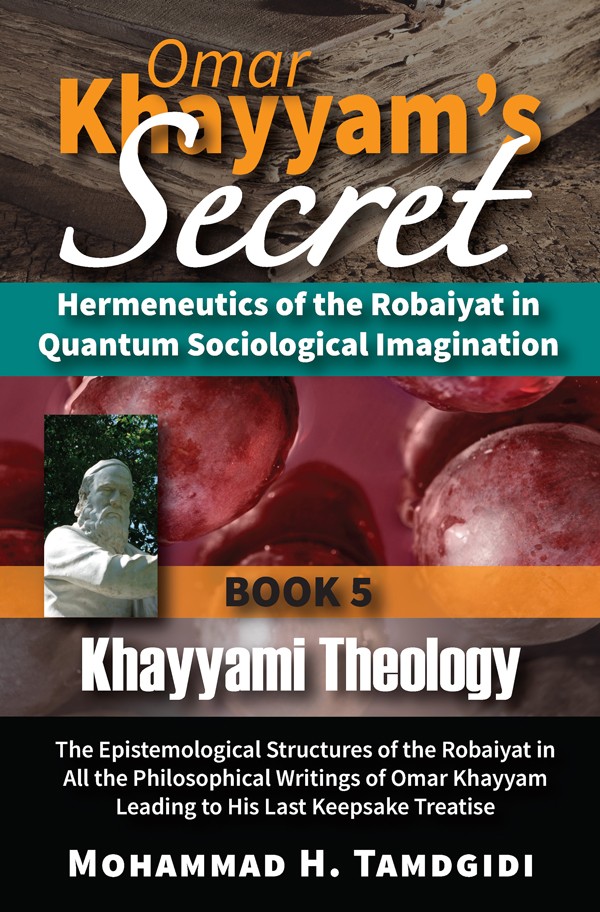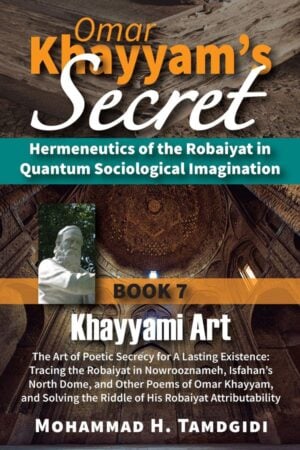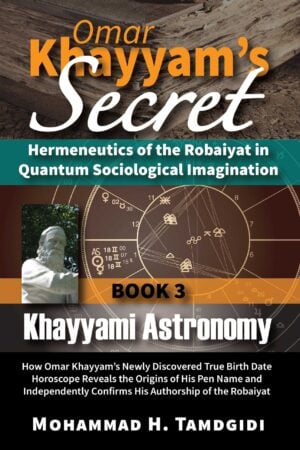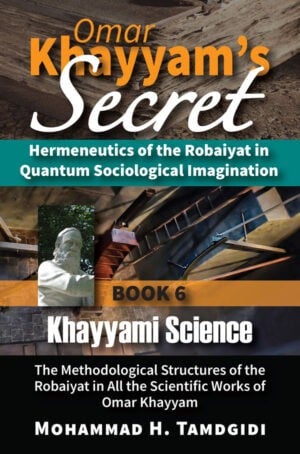Book Section: Preface and the Introduction to Book 5 of “Omar Khayyam’s Secret” Series: Exploring the Theological Epistemology of the Robaiyat in Omar Khayyam’s Philosophical Treatises — by Mohammad H. Tamdgidi
$20.00
This book section includes the preface and and the introduction essays as described below. The essay titled “Book 5 Preface: Recap From Prior Books of the Series,” is an opening and the essay titled “Introduction to Book 5: Exploring the Theological Epistemology of the Robaiyat in Omar Khayyam’s Philosophical Treatises,” is an introduction to the book Khayyami Theology: The Epistemological Structures of the Robaiyat in All the Philosophical Writings of Omar Khayyam Leading to His Last Keepsake Treatise, which is the fifth volume of the twelve-book series Omar Khayyam’s Secret: Hermeneutics of the Robaiyat in Quantum Sociological Imagination, authored by Mohammad H. Tamdgidi.
Description
Abstract
This book section includes the preface and and the introduction essays as described below.
This essay titled “Book 5 Preface: Recap From Prior Books of the Series,” is an opening to the book Khayyami Theology: The Epistemological Structures of the Robaiyat in All the Philosophical Writings of Omar Khayyam Leading to His Last Keepsake Treatise, which is the fifth volume of the twelve-book series Omar Khayyam’s Secret: Hermeneutics of the Robaiyat in Quantum Sociological Imagination, authored by Mohammad H. Tamdgidi. It offers a summary of prior books of the series.
In the overall series, Tamdgidi shares the results of his research on Omar Khayyam, the enigmatic 11th/12th centuries Persian Muslim sage, philosopher, astronomer, mathematician, physician, writer, and poet from Neyshabour, Iran, whose life and works still remain behind a veil of deep mystery. The purpose of his research has been to find definitive answers to the many puzzles still surrounding Khayyam, especially regarding the existence, nature, and purpose of the Robaiyat in his life and works. To explore the questions posed in the series, he advances a new hermeneutic method of textual analysis, informed by what he calls the quantum sociological imagination, to gather and study all the attributed philosophical, religious, scientific, and literary writings of Khayyam.
In the first book of the series, subtitled New Khayyami Studies: Quantumizing the Newtonian Structures of C. Wright Mills’s Sociological Imagination for A New Hermeneutic Method, following a common preface and introduction to the series, Tamdgidi developed the quantum sociological imagination method framing his hermeneutic study in the series.
The second book of the series, subtitled Khayyami Millennium: Reporting the Discovery and the Reconfirmation of the True Dates of Birth and Passing of Omar Khayyam (AD 1021-1123), was dedicated to exploring in depth the hitherto findings and controversies surrounding the dates of birth and passing of Omar Khayyam. Therein, Tamdgidi discovered the true dates of birth and passing of Omar Khayyam.
The third book of the series, subtitled Khayyami Astronomy: How the Newly Discovered True Birth Horoscope of Omar Khayyam Reveals the Origins of His Pen Name and Independently Confirms His Authorship of the Robaiyat, was devoted to a close examination of Omar Khayyam’s newly discovered true birth date horoscope, and what information its hermeneutic study can offer for understanding Khayyam’s life and works, especially the origin, nature, and the purpose of his Robaiyat. Therein, Tamdgidi discovered the horoscope origins of Omar Khayyam’s pen name and independently confirmed his authorship of a collection of robaiyat.
The fourth book of the series was subtitled Khayyami Philosophy: The Ontological Structures of the Robaiyat in Omar Khayyam’s Last Written Keepsake Treatise on the Science of the Universals of Existence. It was devoted to an in-depth examination of Omar Khayyam’s treatise “Resaleh dar Elm-e Kolliyat-e Vojood” (Treatise on the Science of the Universals of Existence) which was written originally in Persian for keepsake toward the end of his life.
The present volume, the fifth book of the series, is subtitled Khayyami Theology: The Epistemological Structures of the Robaiyat in All the Philosophical Writings of Omar Khayyam Leading to His Last Keepsake Treatise. It is devoted to an in-depth examination of all of Omar Khayyam’s philosophical treatises written before his last keepsake treatise on the science of the universals of existence, one the author examined already in depth in Book 4 of the series. The purpose of the study of these texts, applying the quantum hermeneutic method developed for the series, is to arrive at an understanding of the structures of the theological epistemology informing any collection of quatrains or Robaiyat Khayyam may have written in his life.
The essay titled “Introduction to Book 5: Exploring the Theological Epistemology of the Robaiyat in Omar Khayyam’s Philosophical Treatises,” is the introduction to Khayyami Theology: The Epistemological Structures of the Robaiyat in All the Philosophical Writings of Omar Khayyam Leading to His Last Keepsake Treatise, which is the fifth volume of the twelve-book series Omar Khayyam’s Secret: Hermeneutics of the Robaiyat in Quantum Sociological Imagination, authored by Mohammad H. Tamdgidi.
In this book, Tamdgidi will explore all the philosophical writings of Omar Khayyam advancing his theological epistemology leading to his last major treatise on the universals of existence. Except for one of such texts which was written in Persian, others were originally written in Arabic, for which the author will also provide updated Persian translations (building on efforts made by other scholars) besides offering his new English translations for all—offering any necessary corrections, additions, and footnote commentaries, as needed.
These texts, many of which were written by Khayyam in the early 470s LH, beginning in the year 472 LH (AD 1079-1080) can provide us with snapshots of how Khayyam grappled with various issues in Islamic theology and its epistemology before arriving at his final formulations in his last treatise which we studied in Book 4. They can also offer a sense of how Khayyam’s basic worldview as spread-out in these writings sheds light on the epistemological structures of his poetic writings such as his robaiyat.
In this book the author’s aim will be to see in what ways Khayyam’s last treatise on the universals of existence confirms and/or departs from the views he shared in the earlier texts studied in this book. For each text, Tamdgidi will first provide the text in the language it was originally written, followed by his updated Persian translation for Arabic texts, building on the efforts of prior Persian translators of the text. Then he will offer his new English translation of the text before proceeding to analyze the text. His commentaries for each specific text will be offered both in footnotes to the texts or their translations and then separately in the main text in a textual analysis section to follow the presentation of each text in each chapter.
In the last chapter, Tamdgidi will offer his comments on all the writings explored in this book, noting how the findings relate to what we learned about Khayyam’s worldview in the previous book of the series. The author will also comment on any new insights this book’s findings contribute to our understanding the epistemological structures of the Robaiyat.
In this study, applying the quantum hermeneutic method introduced earlier in the series, we adopt an alternative research procedure whereby we derive Khayyam’s views not directly from the disputed Robaiyat, but via a procedure based on careful examinations of Khayyam’s primary and undisputed writings as an alternative pathway toward understanding the origins, nature, and purpose of any poetry he may have composed.
In this book Tamdgidi will study six philosophical/theological texts undisputedly attributed to Omar Khayyam as follows: 1-his invited annotated Persian translation of Avicenna’s “Splendid Sermon” from Arabic; 2-his writing known as “The Treatise on Existence and Duty”; 3-his writing known as “Answer to Three Questions: On the Necessity of Contradiction in the World, On Determinism, and On Survival”; 4-his writing known as the “Treatise on Existence” (not to be confused with the treatise on the universals of existence we already studied in Book 4 of this series); 5-his writing known as “The Light of Intellect on the Subject Matter of Universal Science”; and 6-his writing known as “Response to Three Questions.”
The author ends the introduction by presenting the chapter organization of this book.
Recommended Citation
Tamdgidi, Mohammad H. 2022. “Preface and the Introduction to Book 5 of “Omar Khayyam’s Secret” Series: Exploring the Theological Epistemology of the Robaiyat in Omar Khayyam’s Philosophical Treatises.” Pp. 1-16 in Omar Khayyam’s Secret: Hermeneutics of the Robaiyat in Quantum Sociological Imagination: Book 5: Khayyami Theology: The Epistemological Structures of the Robaiyat in All the Philosophical Writings of Omar Khayyam Leading to His Last Keepsake Treatise. (Human Architecture: Journal of the Sociology of Self-Knowledge: Vol. XVIII, 2022. Tayyebeh Series in East-West Research and Translation.) Belmont, MA: Okcir Press.
Where to Purchase Complete Book: The various editions of the volume of which this Book Section is a part can be ordered from the Okcir Store and all major online bookstores worldwide (such as Amazon, Barnes&Noble, Google Play, and others).
Read the Above Publication Online
To read the above publication online, you need to be logged in as an OKCIR Library member with a valid access. In that case just click on the large PDF icon below to access the publication. Make sure you refresh your browser page after logging in.








